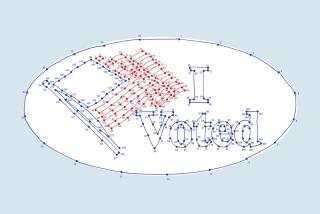Casting a Vote for Change in State’s Presidential Primary
- Share via
Sacramento — California is approaching another so-called “early” presidential primary, and it’s looking again like the old “Peanuts” cartoon strip.
You know, Charlie Brown runs up to boot the football and Lucy pulls it out from under his foot. Here, kick the ball. Splat.
The California primary is the Charlie Brown of presidential politics. The state always thinks that finally, this time, it’s going to exert “clout” in the nominating process. Then a pipsqueak like New Hampshire yanks away the football.
California hasn’t been kicking the ball in recent elections except in its fantasy, in its rationalization for having suckered itself into this early primary scam.
I’ll admit it, a lot of us got fooled. And we could handle the insult -- live with California’s momentary irrelevance -- except that the primary election for state offices also has been dragged into this soggy mess.
There ought to be a law: No state primary during the tule fog season. When the fog hugs the Central Valley floor so densely that planes can’t fly, it’s no time for political races.
There are other problems with a March 2 state primary:
* People are just recovering from the holidays and trying to catch up on their own lives. They’re not paying attention to any state politician whose name isn’t Schwarzenegger. Case in point: Is anybody following that contest for the Republican U.S. Senate nomination?
* A March primary makes for too long an election year, on both ends. A candidate must start tapping fat cats for money by at least the previous fall. Once nominated, there’s a ludicrously long, eight-month general election campaign until November. This creates boredom and costs a bundle. And if the candidate already holds office, it means a long distraction from representing constituents.
Some background:
For much of the 20th century, California had a sensible two-primary system: a presidential primary in May and a state primary in August. But during World War II, we switched to a “consolidated” primary because it was too difficult to send ballots to troops all over the globe. This soon became the traditional June primary that lasted five decades.
It worked great. The season is comfortable. Income taxes have been filed. People aren’t yet off on vacation. They might even think about politics.
California occasionally even exerted presidential clout back when races began later and were marathons rather than sprints. In June 1964, Barry Goldwater won the Republican nomination in a landmark California primary. In 1972, George McGovern captured the Democratic nomination here.
Those were the last decisive California primaries. Since then, we’ve had a series of meaningless yawners. States have been holding their contests earlier and earlier -- “front-loading,” it’s called -- in quest of that elusive clout.
The answer, we thought, was our own “early” primary. So we moved our date from June to late March. Didn’t work. Other states kept advancing their contests. In 2000, we moved up still further, to early March. We didn’t exert clout -- just simply joined a horde of states in collectively clinching the nominations for Al Gore and George W. Bush.
“What we’re going to have inevitably is voting at Christmastime,” says former Secretary of State Bill Jones, front-runner in the GOP Senate race. Jones tried to create a rational system of rotating regional primaries, but the weeny states balked.
Now, the pampered peewees -- Iowa and New Hampshire -- are at it again, winnowing candidates for the rest of America. Before our voice is heard, 19 states will have held contests, selecting one-fourth of the Democratic convention delegates.
Ten other states will join California in voting March 2, and by that night, nearly two-thirds of all delegates will have been chosen.
Ever optimistic, some California analysts envision this state still being pivotal because Iowa shuffled the candidate deck. Maybe the nomination won’t be wrapped up before California.
Yes it will, if Massachusetts Sen. John F. Kerry follows his Iowa upset with a runaway New Hampshire victory Tuesday. Then it’s effectively over. Done.
We’ll have been fooled again. Our “early” primary won’t be early enough to mean much nationally -- but way too early for a sane state primary.
The solution is to split the primary -- one presidential, one state. Like most early states do. Move up California’s presidential primary to one week after New Hampshire’s. Return the state primary to June.
There have been efforts to split the primary, but they always get tangled in politics. Once, Democrats wanted to keep an early state primary so Republicans wouldn’t have time to repeal an anticipated redistricting gerrymander.
Gov. Gray Davis, campaigning for reelection, vetoed a two-primary bill because he feared the extra $40-million cost. A small price for democracy.
Last year, a bill passed the Senate but stalled in the Assembly when Speaker Herb Wesson (D-Culver City) tried to use it to extend term limits.
“It’s all absurd,” says the bill’s termed-out author, Sen. Ross Johnson (R-Irvine). “But I’ve given up. Somebody else can worry about it.”
If the primary can’t be split, we should all give up. Pick up our football and return to a June single primary. Play the presidential game only in November -- with 20% of the electoral votes needed to win.
More to Read
Get the L.A. Times Politics newsletter
Deeply reported insights into legislation, politics and policy from Sacramento, Washington and beyond. In your inbox twice per week.
You may occasionally receive promotional content from the Los Angeles Times.











